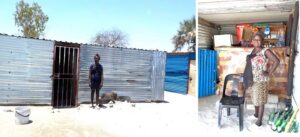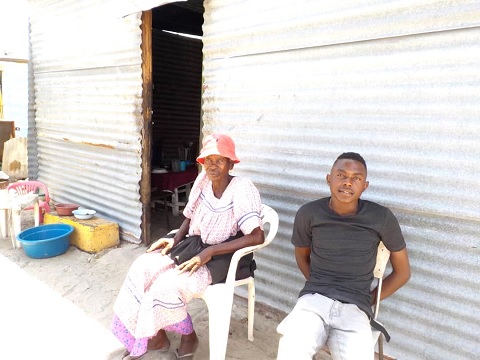By Elina-Ombili Shishaki /
Ondangwa is said to be the oldest town in the north of Namibia.
The town boasts of a history dating back to the 1960s and 70s when every young man on the way to work in the south had to pass through Ondangwa.
Even in the 80s when the present-day northern regions of Oshana, Oshikoto, Ohangwena and Omusati were collectively known as Owamboland, and administered as a semi-autonomous nation (Bantustan), Ondangwa was the capital city.
Indeed during the long period of colonialism, where the northern part of the country was concerned, Ondangwa was the centre of civilisation.
Today Ondangwa is known as Ondangwa yaShinime Shiimvula, a town growing towards becoming the industrial hub of the north.
Omutumwa receives a warm welcome by Mrs Rosaria Paulus, a 32-year-old mother of five who reside in Uupopo informal settlement of Ondangwa.
Uupopo is located just a stone’s throw away from Gwashamba Mall, one of the sleek shopping malls of Ondangwa.
Paulus was born at Onambutu village in Ohangwena region. In search of a better life she moved with her late mother to Ondangwa.
“I was very young, therefore I grew up here and this just became my home town,” Paulus says waving in the direction of Gwashamba Mall.
As she grew up she settled at a one-bedroom shack house with her husband and five children of which two of them are schooling at Olukolo Primary School.
Paulus’ husband is the primary breadwinner who works as a builder on contractual basis.
“Some years back it was better, but these days he finds it difficult to secure an odd job.
“We somehow manage to survive on the state’s vulnerable children grant for one of our children, a grant that we receive monthly from the Ministry of Gender,” she says.
Despite her jovial nature, Paulus narrates a daily battle with unemployment, poverty and starvation.
“At times we sleep on an empty stomach since there is no food in the house. The grant money is not enough to cover for household expenses and to pay for children’s school fees.”
She says that she does have an income-making skill. She expresses her desire of opening a hair salon but since she is burdened with too many responsibilities but no income she is forced to stay at home and tend to her children.
She also raises the issue of uncertainty over their home.
“Since my family is growing, I wish to have my own place as we are on the verge of losing this, the only place we call home.”
There is no tap at her residence and she pays N$70 monthly to fetch water from her neighbour’s house.
“Living in a shack is not comfortable, but at least it is bearable,” she says. “What is not nearable is the situation of not having food. We are therefore pleading with the town council to at least provide us with drought relief food items occasionally.”
Another resident of Uupopo, Ms Helena Nghihulu, a 27-year-old, echoes the same sentiment as Paulus, saying that she struggles daily to put bread on the table and run the household affairs.
Nghihulu mentions that she finds it hard to secure a decent job, and selling kapana has been her last hope.
“I live with six other occupants including four children of which two of them are schooling at Olukolo Primary School,” Nghihulu says.
“After my parents relocated to the village, I decided to erect a shack of my own four years ago. But there is no water at my residence neither is there electricity nor a proper toilet.”
She further adds that she buys water daily at a cost of N$5 per container.
“Every day I keep wondering if my family will eat a morsel of food. Most of the time the kids go to school on an empty stomach, the profit I make from kapana is not sufficient to cover all the expenses.”
Karolina Daniel, a 38-year-old resident of Omashaka settlement who hailed from Omadano village in Eenhana Constituency expresses that living in a shack with no water and a proper toilet is a living nightmare.
“I am suffering from an ailment and staying alone in my shack. At times things get worse that I couldn’t move an inch, thus I mostly rely on other residents.
“I usually fetch water from neighbours at a cost of N$2 per container and at times they provide me with free water. I rely on my neighbours who lend a helping hand with cooking, washing and fetching water,” says Daniel.
She adds that her meals of the day solely depend on the profit she makes from her tuck shop.
Although Daniel has lived at her shack for 16 years she still has not managed to have the plot on her name.
In the row of shacks across the street is shack 317, where Kuku Padelia Nghidishange, a 70-year-old senior resident of Omashaka settlement lives.
“I hailed from Okanghudi village in Ohangwena region; I moved to Ondangwa with my late husband in my early 20s,” she narrates.
At her age, and despite having lived in Ondangwa for close to 50 years, Nghidishange has no national documents.
“My concern is that I don’t receive monthly pensioner grants as I am yet to acquire national identification documents.
“As the head of the household I have to shoulder household responsibilities but in my case I am yet to acquire national identification documents, and this is delaying my monthly pensioner’s grant.”
Mrs Nghidishange lives with her three grandchildren in her four bedroom corrugated iron shack house. There is no water, and no electricity, nor a toilet at her shack, however she gets free water from her neighbours.
Meanwhile, Ondangwa Town Council is busy upgrading its informal settlements. This is the information coming from the town’s Public Relations Officer, Mrs Petrina Shitalangaho.
“The council is acting in line with the five-year strategic plan under the strategic initiative for developing informal areas. Hence, we have started to implement this plan by upgrading informal settlements in Ondangwa,” says Shitalangaho.
Currently there are six informal settlements in Ondangwa, namely Omashaka, Onantsi, Omakulukuma, Ondiiyala, Uupopo and Okangwena.
“Onantsi is a new informal settlement on the outskirts of Ondangwa town that is developing at a fast pace. This location is well upgraded, there is water, electricity and street lamps. There are also gravel roads which were unveiled in July this year,” Shitalangaho emphasises.
She points out that the gravel roads also benefited other informal settlements like Uupopo, Ondiiyala and Omakulukuma.
“During the rainy season residents in this area experience difficulties to cross-over to Extension 25/Ondiiyala (a nearby settlement) therefore the town council constructed a bridge so that residents and vehicles can easily cross.”
The council also installed a sewer at Omakulukuma location which is yet to be completed.
Shitalangaho further points out that Uupopo location is formalised. “The town is done with planning, surveying and gazetting.
“This is an opportunity for local residents to acquire land through the town council. Land owners can purchase off land from town council, register their plots and get title deeds,” she states.
“Additionally, Uupopo is well-upgraded with provisions of water and electricity (street lamps). However the council is busy with electricity for house connections, a project that was funded by the Ministry of Mines and Energy through NORED in collaboration with the town council.”
There is a new extension for Omashaka that was recently developed and inaugurated.
“In order to minimise the number of shacks and meet the demands for municipal services in the informal settlements the town council allocated plots to the Build-together project and construction of these houses is currently underway in Onantsi location.
“In previous years the council had also handed over plots to Shack Dwellers Federation at Extension 25 and most of these plots are fully constructed.
“In the past years National Housing Enterprise (NHE) built houses at Extension 3, and are currently building low-cost brick houses in Extension 25 that will benefit those that are in shacks,” says Shitalangaho.
In response to whether there are municipal facilities to cater for all those living in informal settlement, Shitalangaho says that there are no communal public taps or toilets in any of these informal settlements, and when making water provision the council connects directly to individual households.
“We had once installed a public tap and public toilets in Okangwena location. It eventually became a health hazard to the community since it was vandalised and not properly maintained, therefore the council advised the residents to have septic tanks and have own toilets instead.”
Water being a basic necessity, its provision comes at a cost since “at times residents delay with the paying of their rates and taxes to the council,” Shitalangaho says.

In the photos: Kuku Nghidishange pictured with her grandson at her household in Omashaka location. Also in other images is Uupopo resident Helena Nghihulu at her home, and Karolina Daniel pictured at her tuck shop in Omashaka.

[NB. This article was produced with the financial support of the European Union. Its contents are the sole responsibility of Omutumwa and do not necessarily reflect the views of the European Union.]







